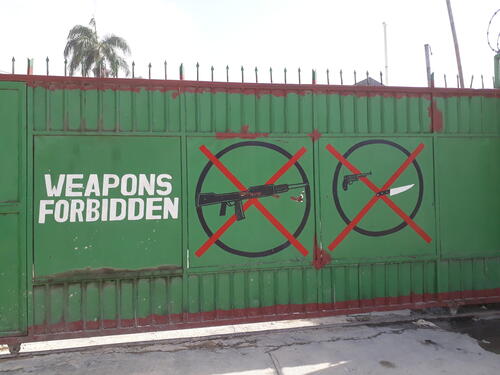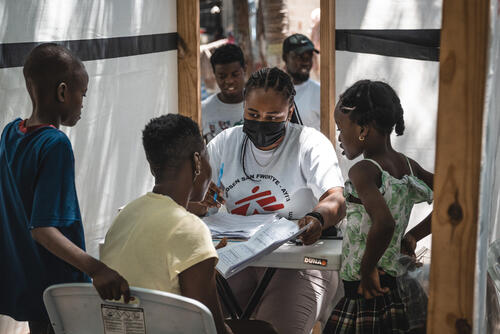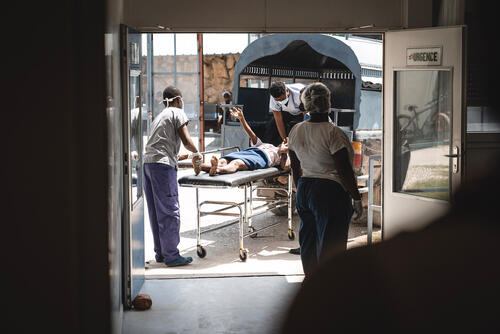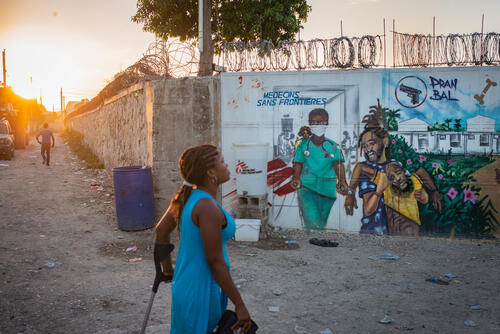PORT-AU-PRINCE – A spike in violence in Haiti's capital is putting medical activities in jeopardy, Médecins Sans Frontières (MSF) said today, warning that medical care cannot be sustained while armed clashes and robberies affect health facilities, vehicles, patients and staff.
In the first week of June, clashes in the Martissant neighbourhood, and other districts of Port-au-Prince, have caused many injuries and displaced more than 1,000 people, including MSF patients and staff. From 2 to 4 June, MSF's emergency centre in Martissant received 42 patients with gunshot wounds, with the most severe cases transferred to our trauma hospital in the Tabarre neighbourhood. During the same period, Tabarre hospital received 42 patients in total, including 38 with gunshot wounds, forcing us to increase our capacity from 50 to 68 beds.
We are witnessing an extremely worrying deterioration in the security situation... staff [have] had to take cover from stray bullets.Alessandra Giudiceandrea, MSF head of mission
“We are witnessing an extremely worrying deterioration in the security situation,” said Alessandra Giudiceandrea, MSF head of mission. “Some armed clashes took place near MSF's emergency centre and offices in Martissant, where staff had to take cover from stray bullets.”
“Armed individuals robbed two MSF ambulance drivers among other vehicles travelling from Martissant,” said Giudiceandrea. “To protect our staff, we had to reduce our community activities, but we are still treating emergencies based on our initial admission criteria.”
Between 15 and 31 May, clashes also took place in the Cité Soleil and Bel Air neighbourhoods, during which Tabarre hospital cared for 41 patients, including 32 victims of violence, exhausting the hospital’s capacity. In another incident, a staff member of our Tabarre hospital was shot and killed on 25 May while returning home from work.
The increased level of chronic violence is taking place amid a broader political and economic crisis in Haiti that affects people in many ways. Health systems are strained not only by insecurity, but by a current increase in COVID-19 cases, economic challenges, and a high level of medical needs.
“At a time when we should be scaling up because of COVID-19 and other needs, we are struggling to keep our existing facilities open due to insecurity,” Giudiceandrea said. “We ask everyone to respect the need for medical activities to continue.”
In Martissant, insecurity and displacement may be hindering patients' ability to reach healthcare. While our emergency centre in Martissant reported an influx of trauma patients following the largest incidents of violence last week, patient numbers have now dropped below the centre's normal average.
MSF also provides care to victims of sexual and gender-based violence in Port-au-Prince and Gonaïves, but clinic staff are now seeing fewer patients, as people may fear leaving their homes to seek medical attention. We are concerned that the general increase in violence in the country is affecting the ability of sexual violence victims to seek much-needed care.
MSF has provided lifesaving medical care to communities in Haiti for 30 years, but to continue providing such services in any community, we must be able to ensure the safety of patients and staff en route to, and inside, healthcare facilities.
MSF demands that all groups and individuals involved in incidents of violence in Haiti respect the safety of healthcare workers, patients, medical supplies and facilities, and that healthcare vehicles are granted safe passage without risk of attack.






